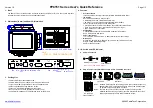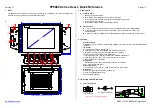
For framed PV-Modules
pitched rooF application
Needed tools and materials
• Open Ended Wrenches (10, 13)
• Metric Allen Wrenches or Driver sizes: M (5, 8)
• Cordless screwdriver
• Approved flashing system or standoff device for the
attachment of the system on the roof
Note:
We want to point out that our mounting instructions reflect the state of technology and our experience on how to
install our systems on site. Due to the fact that each roof has individual characteristics, we highly recommend
commissioning a professional assessment before beginning the installation. In particular it is necessary to take into
account static requirements. During the installation of the system, bear in mind the compliance with the
corresponding norms and legislation referring to the prevention of accidents
(see also page 9).
Würth Solar’s pitched roof systems are designed from
the Angle Bracket up and must be attached to an approved
and properly installed standoff or flashing system of the
installer’s choice.
Angle Brackets must have hardware installed
before installation can begin. To do this, insert
one of the T-Bolts provided and loosely fasten
with a nut and washer.
See Figure 1.1
Approved flashing or standoff devices are to
be properly installed along the desired plane
for the installation of the mounting rails. The
rails that will be mounted on these will serve
as the structure to which the solar modules
are mounted.
Angle brackets can now be fastened to an
approved and properly installed flashing or
standoff device such as the Quick Mount PV™
version shown here.
See Figure 1.2
(Torque: Dependent on size of hardware)
Subject
to
technical
changes
Copyright
©
2009
HatiCon
Solar,
LLC
Page
1
of
10
Assembly
Instructions
Pitched
Roof
Application
*for
framed
PV
‐
Modules
Needed
tools
and
materials
►
Open
Ended
Wrenches
(10,
13)
►
Metric
Allen
Wrenches
or
Driver
sizes:
M
(5,
8)
►
Cordless
screwdriver
►
Approved
flashing
system
or
standoff
device
for
the
attachment
of
the
system
on
the
roof
We
want
to
point
out
that
our
mounting
instructions
reflect
the
state
of
technology
and
our
experience
on
how
to
install
our
systems
on
site.
Due
to
the
fact
that
each
roof
has
individual
characteristics,
we
highly
recommend
commissioning
a
professional
assessment
before
beginning
the
installation.
In
particular
it
is
necessary
to
take
into
account
static
requirements.
During
the
installation
of
the
system,
bear
in
mind
the
compliance
with
the
corresponding
norms
and
legislation
referring
to
the
prevention
of
accidents
(see
also
page
10).
Subject
to
technical
changes
Copyright
©
2009
HatiCon
Solar,
LLC
Page
2
of
10
HatiCon
Solar’s
pitched
roof
systems
are
designed
from
the
Angle
Bracket
up
and
must
be
attached
to
an
approved
and
properly
installed
standoff
or
flashing
system
of
the
installer’s
choice.
Angle
Brackets
must
have
hardware
installed
before
installation
can
begin.
To
do
this,
insert
one
of
the
T
‐
Bolts
provided
and
loosely
fasten
with
a
nut
and
washer.
See
Figure
1.1
Approved
flashing
or
standoff
devices
are
to
be
properly
installed
along
the
desired
plane
for
the
installation
of
the
mounting
rails.
The
rails
that
will
be
mounted
on
these
will
serve
as
the
structure
to
which
the
solar
modules
are
mounted.
Angle
brackets
can
now
be
fastened
to
an
approved
and
properly
installed
flashing
or
standoff
device
such
as
the
Quick
Mount
PV™
version
shown
here.
See
Figure
1.3
(Torque:
Dependent
on
size
of
hardware)
1.1
1.2
Subject
to
technical
changes
Copyright
©
2009
HatiCon
Solar,
LLC
Page
2
of
10
HatiCon
Solar’s
pitched
roof
systems
are
designed
from
the
Angle
Bracket
up
and
must
be
attached
to
an
approved
and
properly
installed
standoff
or
flashing
system
of
the
installer’s
choice.
Angle
Brackets
must
have
hardware
installed
before
installation
can
begin.
To
do
this,
insert
one
of
the
T
‐
Bolts
provided
and
loosely
fasten
with
a
nut
and
washer.
See
Figure
1.1
Approved
flashing
or
standoff
devices
are
to
be
properly
installed
along
the
desired
plane
for
the
installation
of
the
mounting
rails.
The
rails
that
will
be
mounted
on
these
will
serve
as
the
structure
to
which
the
solar
modules
are
mounted.
Angle
brackets
can
now
be
fastened
to
an
approved
and
properly
installed
flashing
or
standoff
device
such
as
the
Quick
Mount
PV™
version
shown
here.
See
Figure
1.3
(Torque:
Dependent
on
size
of
hardware)
1.1
1.2
Fig. 1.1
Fig. 1.2
Assembly Instructions
8
Solar
Mounting Sytem






































